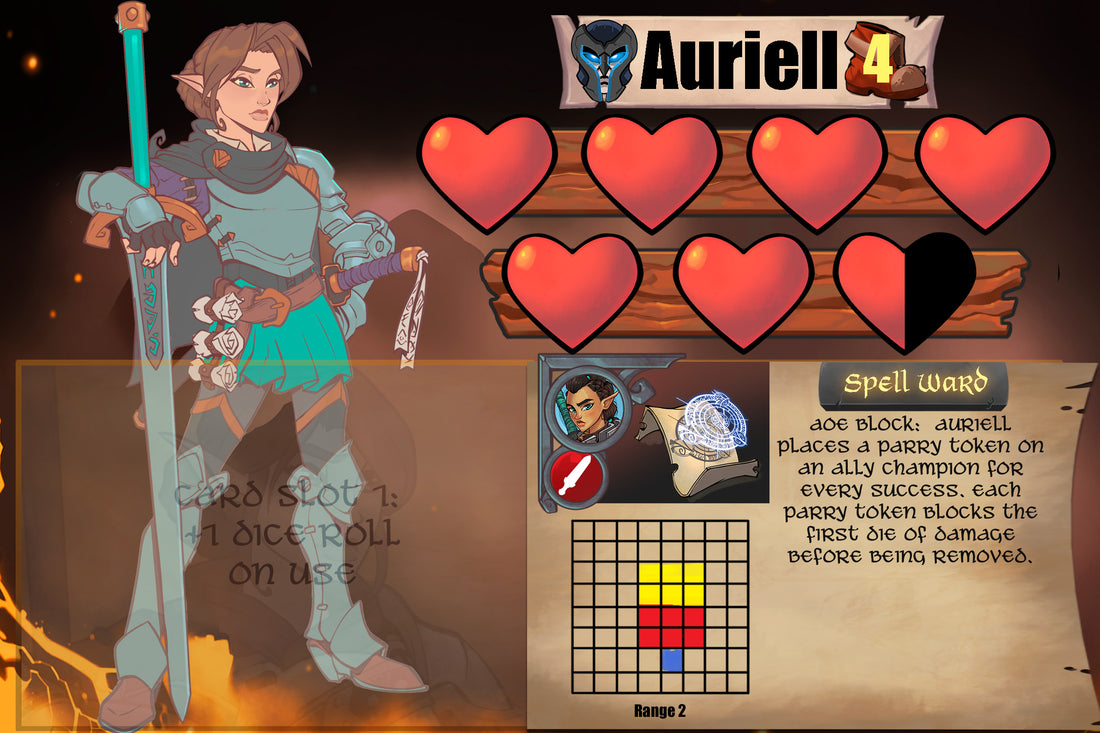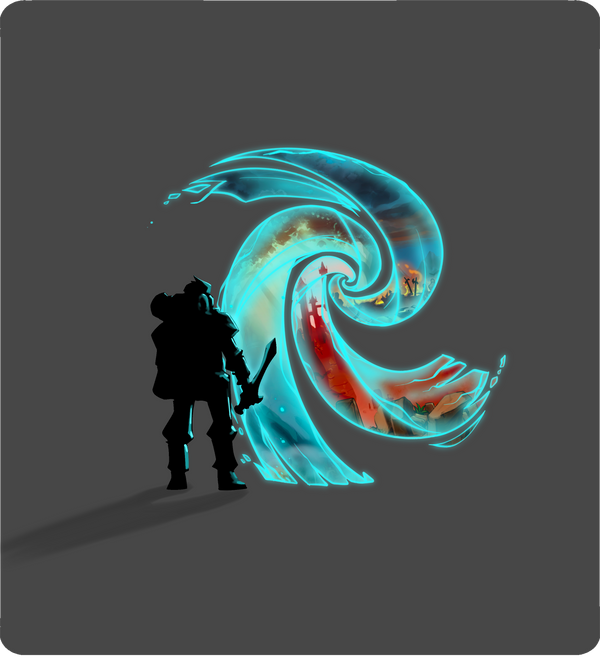
Quest Forged Arena Introduction
Share
Hello hunters! Today, I figured I'd go through the basics of Quest Forged Arena for anyone who is finding us now and wants to learn what we're all about. Quest Forged Arena is an easy-to-learn, hard-to-master player versus player hero brawler that has been in development for 6 years now. What does that actually mean? We have our in-depth rulebook below, but I hope to go over the broad strokes of what we're developing!
https://questforgedarena.com/pages/rulebook
Special thanks to DarthTader and MarkyMarkk in our discord for proofreading!
We are aiming for this game to be very player friendly and customizable to the experience you're looking to have. Our base rule set is built for two players that each pick three of our twelve heroes, but the majority of our rules are meant to be scalable. We believe we've designed a game where two players can each pick one or five characters. Where you can sit down at your kitchen table and play with five people, or log onto Table Top Simulator and create a bracketed tournament with friends all over the globe. We hope that this allows players to pick up a game in a quick break at work, while still providing an opportunity for longer games with more intricate rulings.
Easy-to-learn, hard-to-master is a core tenant to how we'd like to make games. It's very important that you can teach a friend how to play within a single game. The first game usually lasts a bit longer, due to the number of decisions that can be made, so we've also developed some additional rules that are used only when running a tutorial game. It's meant to use easier champions, and it uses a smaller board to force players to fight each other.
We have learned a lot from RPGs, MOBAs, Arenas in games like World of Warcraft, and picked up many different ideas and terms throughout other forms of fantasy and media. Thanks to our own nerdiness, we've borrowed some terms we like, and made up some of our own. We have a class system that is broken into three separations. We have Guardian, Assault, and Support champions. We generally recommend that each player pick one of each class.
Guardian champions excel at protecting their allies and controlling the battlefield. This may come in the form of redirecting attacks, blocking incoming damage, and moving their opponent's champions into danger or behind obstacles. Utilizing Guardians effectively is incredibly important to the game, as we find that most of our less successful players don't utilize their movement and end up becoming sitting ducks. Guardians not only discourage this style of play, but they actively break it up.
Assault champions are built to have high damage output, and in most cases high mobility. This is generally the champion that you'll build your team around, or at least always consider when drafting your team. Assault champions will likely take up the majority of your action economy, and most of your turns will be spent either trying to take out your opponent's assault champion or maneuvering your own to protect them.
Support champions focus on keeping their allies alive and providing other benefits or buffs. Abilities from this class are usually crowd control, healing, or moving your allies out of harm's way. Your Support champion generally needs to be protected by your Guardian champion, and your Assault will generally apply pressure to your opponent in order to require them to use their support abilities. In turn, this keeps them from doing as much damage to your team.
Below I will explain some other key concepts that may be obvious if you play a lot of games, but won't be if you're just now picking them up, or if you're teaching Quest Forged Arena to a friend.
Health: Shown in the form of hearts and half hearts, each champion has their own unique health pool that will be tracked on their character card. This shows you how much damage a character can take before they are knocked out. Once a team receives three knock-outs, they lose, so maintaining your health is a crucial step to success.
Attacks: Actions that allow you to deal damage to an enemy champion's health. There are a lot of different types of attacks, and each character has their own range and attack patterns that affect different areas of the battlefield. This will be easier to explain and illustrate in a video, so watch out for that update!
Heal: Actions that allow you to restore the health of your champions. This cannot be used to bring a champion with 0 health back to the battlefield, and you cannot heal a champion above their maximum health pool.
Block: Tracked using Block Tokens, this is temporary health that does allow you to exceed a champion's maximum health pool. Damage that is dealt to a champion is dealt to their Block Tokens, removing one for each damage dealt, before you deal damage to an opponent's health. Any additional damage over the number of Block Tokens you have is dealt directly to the defending champion's health pool.
Cover: Most attacks hit the first champion in range. Cover is something that you are able to place a champion behind that would block most attacks aimed at your champion. Again, this will be easier to show and explain in a video, so look forward to that soon!
Dice: This defines your action economy. Each player has four six-sided dice that are used to indicate the number of actions you can take in a turn. When you roll them, the outcome of your ability is determined by the numbers you roll. If you roll a one, you miss, and nothing happens. If you roll a two through five, you get one success. If you roll a 6, you get two successes from that dice. Each action uses successes differently, and some care about the order of the dice you roll, so always be sure to read your champion's actions before rolling dice. You can roll up to four dice on a single ability, but you must decide how many dice you're going to use before you roll.
Knock Out: When you reduce a champion's health to 0, they are returned to their base, they are restored to full health, and the player controlling that champion receives a Knock Out Token. Whenever a player reaches three Knock Out Tokens, they lose the game. Remove all of their champions and tokens from the battlefield. If there is more than one player remaining, keep playing until a winner is declared. The last player standing is the winner.
That is all for this week, I hope this helps you in the arena and on your hunts, and I hope to see you again soon!
With love,
Quest Master Kayden
